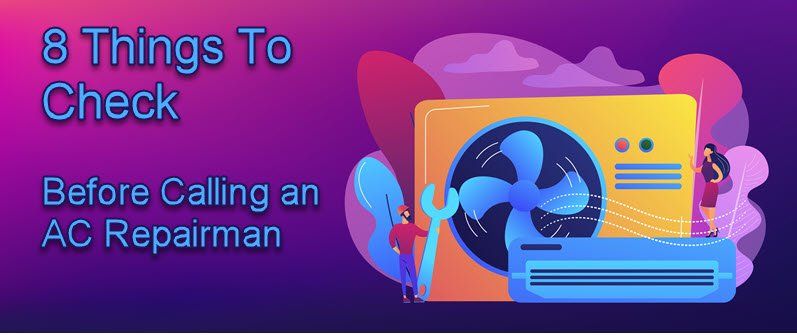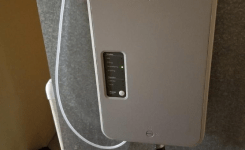What to Check Before Calling An AC Repair Service
Posted by Shawn Larsen | AC Maintenance | Posted on August 5, 2021

It’s natural to panic when your air conditioner unexpectedly stops working. After all, your air conditioner keeps the temperature in your house or apartment cool and comfortable even during hot weather. You might be tempted to instantly make an SOS call to an AC repair service company when your air conditioner conks out.
However, we encourage you to pause for a moment before you hit that dial button on your smartphone. It’s a smart idea for you to check your air conditioner first. Maybe you just encountered small issues that you can remedy through simple fixes.
Before you call an AC repair service company, find out first if you can fix the problem yourself, so you can save time and money.
8 Simple Things To Check Before You Call an AC Repair Service Company
Here are some of the things you should check on your own before you seek professional help from AC repair experts.
1. Check Your Filter
The first thing you should check is the filter of your furnace and air conditioner.
(Never done it yourself before?
Check out our how-to video)
It’s possible that your filter is clogged already, especially if you haven’t changed it recently. A dirty filter limits airflow, so it minimizes your Furnace or AC unit’s capacity to warm or cool the air.
Make sure to change your filter within the recommended time frame of the manufacturer, which is usually about every 90 days. Think of it this way: When you change the oil in your, change the filter in your system.
Take note that you may need to swap your filter more often if you live with pets, live around new construction or are remodeling, and especially if you use your furnace or air conditioner around the clock.
2. Check Your Circuit Breakers
If your air conditioner is in fairly good condition, there is a possibility that the unit itself may not be faulty. That’s why you should examine your circuit breakers and fuses to confirm if they were unexpectedly tripped.
Wait for your air conditioning unit to cool down for approximately five minutes. Afterward, you can try resetting your breakers and see if your AC unit will start running again.
3. Check for Warm Air Leaks
Your AC unit may have a hard time producing cool air if warm air is leaking into your house or apartment.
That’s why you should carefully observe the seals surrounding a window-type air conditioner. Reseal your AC with weather stripping to prevent hot air from seeping in and cool air from leaking out of the room.
4. Check Your Vents
Maximum airflow from your AC unit is only possible if all your vents are open.
If all or some of the vents are closed, your air conditioner will struggle to cool your apartment or house. The reason behind this is that the warm air from the areas with closed vents will spread itself to where the cold air is coming from.
All you need to do is to check regularly if all the vents in your AC unit are wide open.
5. Check Your Thermostat Settings
One of the simplest reasons why your air conditioner is not operating correctly could be because of your thermostat settings. Make sure that your thermostat is set according to your personal temperature preferences.
In case the temperature does not seem accurate, move your thermostat to prevent it from being exposed to direct sunlight. Extreme heat may cause your thermostat to inaccurately measure temperature
6. Check for Outdoor Leaks
It’s normal for your AC unit to produce small pools of water under the condenser unit during hot, humid weather. It could also cause leaks during cold weather when it freezes up and then melts.
However, if your air conditioner leaks in other situations, you should attempt to clean or replace your filters. In case the leaking continues, you may need to call an AC repair expert to address more serious problems, such as a broken condensate pan, lack of refrigerant, or drain pipe blockages.
7. Check for Indoor Leaks
Indoor leaks may cause water damage inside your house or apartment. Turn off your AC unit if you notice any indoor leaks.
Check if the condensate drain lines are clogged up. You can attempt to use a wet or dry vacuum to unclog the drain line on your own. If the problem is more significant, an AC repair service professional might need to replace or repair your rusty or broken condensate pump.
8. Check for Plant Crowding
Trees and plants may add a fresh touch to your garden, but they can also affect the airflow in your home.
Investigate if any plants or trees are crowding the compressor of your air conditioner. An outdoor compressor for central air requires enough airflow to function well. Make allowances for a minimum of two to three feet of space between your compressor and your trees and plants.
You should also ensure that there are at least five feet of clearance space between the top portion of your AC unit and the trees that tower over it.
Contact Larsen HVAC for Quality AC Repair Services
If your air conditioner at home is still not working even after you check all of the items on the list, it’s now time for you to get professional help from a trustworthy AC repair service company.
Larsen HVAC is certified to repair all models and makes of air conditioners, including your own. We particularly specialize in Rheem air conditioners.
Larsen HVAC provides affordable AC repair service to homeowners and apartment dwellers like you. Our expert technicians will carefully diagnose your air conditioner and explain the issues before they proceed with the repairs.
Larsen HVAC offers same-day service for repairs on all AC components, such as compressors, controls, freon, fans, motors, thermostats, boards, repair leaks, R-22, and R410-A.
We also provide other useful services for your homes, such as heating and furnace repair, gas line installations, water installations, and more.
Call us at 801-915-5210 or send us a message to have your air conditioner repaired by Larsen HVAC



